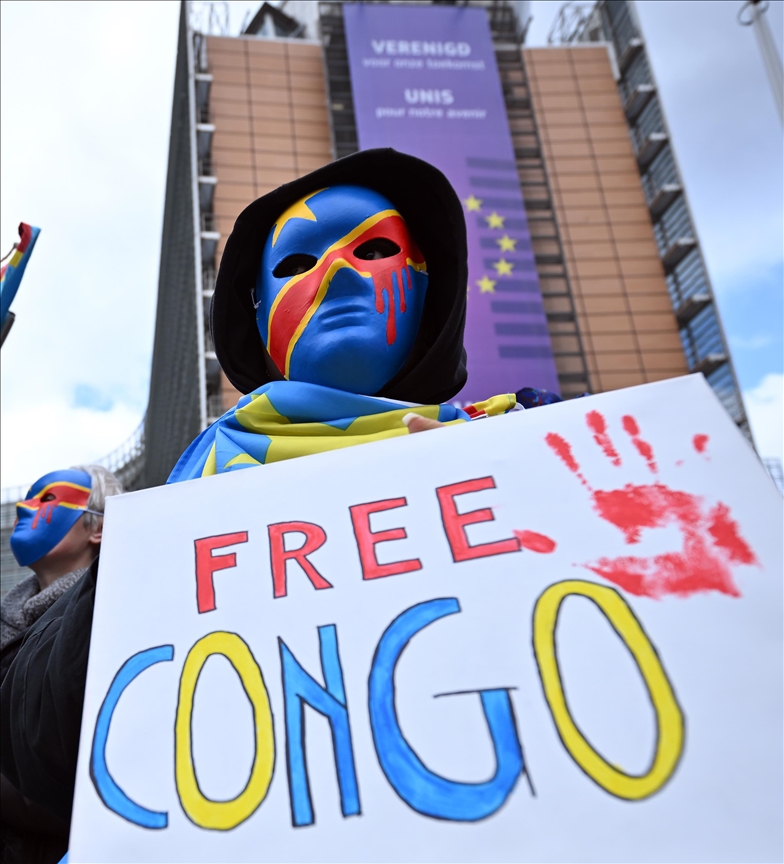INTERVIEW – ‘Unspeakable economic interests’: Rwanda says accusations mask Western resource ambitions in Congo
Rwanda is under Western pressure for allegedly backing rebels in Congo, but its Foreign Minister Olivier Nduhungirehe asserts that the real driver is their scramble for the DRC’s vast mineral wealth

- Rwanda is under Western pressure for allegedly backing rebels in Congo, but its Foreign Minister Olivier Nduhungirehe asserts that the real driver is their scramble for the DRC’s vast mineral wealth
- 'It was Belgium that mobilized the international community, economic partners, to take sanctions against Rwanda … under these conditions, it became difficult to maintain diplomatic relations, Nduhungirehe says at 2025 Antalya Diplomacy Forum
- 'Rwanda is a developing country, and it’s a country with an ambition to get rid of development aid and embrace trade and investment,' Nduhungirehe tells Anadolu
ANTALYA, Türkiye
Rwanda is facing mounting international pressure — particularly from Western powers — over accusations that it backs rebel groups in neighboring Congo.
But according to Rwandan Foreign Minister Olivier Jean Patrick Nduhungirehe, the real motivation behind the criticism is not concern for regional stability, but rather “unspeakable economic interests” in the mineral-rich Democratic Republic of Congo.
Kigali denies backing the M23 rebels, who have seized territory in the eastern Democratic Republic of Congo, but that hasn’t stopped the US, UK, and Belgium from imposing penalties earlier this year. In response, Rwanda severed ties with Belgium, its former colonial ruler.
Speaking to Anadolu at the 2025 Antalya Diplomacy Forum in the Turkish Mediterranean city, Nduhungirehe said Belgium's actions were particularly difficult to accept for Rwanda.
“It was Belgium that mobilized the international community, economic partners, to take sanctions against Rwanda, and so under these conditions,” he said, adding that this made it increasingly difficult for Kigali to maintain diplomatic relations with Brussels.
Congo conflict and efforts for peace
Western countries, Nduhungirehe argued, are “turning against Rwanda to support a country like DR Congo, one of the richest (countries) in the world in terms of resources … but one that could not share it with its population.”
M23 rebels intensified attacks against the Congolese military in December, capturing key hubs near the border with Rwanda in the weeks that followed. The conflict has displaced thousands, forcing people to flee to surrounding provinces and neighboring countries, according to the UN.
Now, efforts to de-escalate the situation have gained new momentum, with the African Union leading a renewed diplomatic push. It follows a meeting in Qatar between Congolese President Felix Tshisekedi and Rwandan President Paul Kagame.
He said it was “regrettable” that the West chose to impose sanctions at a time when the political process to resolve the crisis was showing promise. Still, he played down the impact of the sanctions on Rwanda’s economy and development.
Expressing hope that dialogue would lead to lasting peace, Nduhungirehe emphasized Kigali’s commitment to helping resolve the conflict.
He also underscored the significance of the recent meeting in Doha. “It was very important,” he said, noting it was the first time Kagame and Tshisekedi had met since September 2022 in New York.
Trade, not aid
Turning to Rwanda’s broader development strategy, Nduhungirehe expressed pride in the country’s transformation since the 1994 genocide, which left hundreds of thousands dead and the nation in ruins.
During that dark period, “Western countries were either silent or accomplices,” he said.
Since then, Rwanda has effectively used international aid to rebuild. But the country is now aiming to move beyond assistance, focusing instead on trade and investment.
“We want to get rid of development assistance,” said Nduhungirehe.
He highlighted Rwanda’s drive for regional integration and global engagement through multilateralism, while voicing concerns over recent US trade policies.
Tariffs imposed by the Trump administration, he noted, could also impact African economies. Still, Rwanda is determined to expand its global partnerships.
“We’re going to … see how we can promote trade and investment between Rwanda and the United States,” he said, “but also between Rwanda and other countries around the world, because Rwanda is a developing country, and it’s a country with an ambition to get rid of development aid and embrace trade and investment.”
Anadolu Agency website contains only a portion of the news stories offered to subscribers in the AA News Broadcasting System (HAS), and in summarized form. Please contact us for subscription options.







